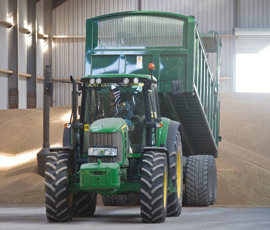Great quality – but is the worst to come?

Cereal quality in the West Country has been excellent so far, but the worst of the harvest could be yet to come.
According to Ian Eastwood, marketing manager at West Country Grain, central stores in Somerset, Devon and Cornwall had been taking in a mix of winter barley and oilseed rape over the past couple of weeks.
And more recently Cannington Grain had started taking linseed, winter oats and early milling wheat, he said.
“It’s very pleasing to see such great quality – it makes such a difference,” he said. Most crops had been coming in dry, or requiring just a small amount of drying to bring them into specification, which would save on costs.
“In general, winter barley has done quite well; yields have been in line with the five-year average, which surprised quite a lot of people. However, there hasn’t been that much in the ground because of the difficult autumn.”
Early drilled oilseed rape crops had also done well, but the later established crops, which were now starting to be cut, were not quite as good, said Mr Eastwood.
“One or two samples are coming in with admixture issues now, because maturity is so uneven. But I think people who sat on the fence and didn’t rip up their crops are being rewarded, because plants have filled in very well.”
Many farmers had only just sprayed off their rapeseed, so it would be at least 10-14 days away.
Early drilled oats and wheat were of excellent quality, with clean samples and bold grains, he added. “We’ve got some feed wheat coming in at 76-77kg/hl, and we’re likely to see more oats coming into the Devon store by the end of the weekend.”
And spring barley wouldn’t be far off, said Mr Eastwood. “It’s only been in the ground since mid-March, but the sunny July did the crops a lot of good.”
Unusually, he reckoned the earliest crops would be the best of the year, with later planted crops having struggled during the winter.
“We’ve got a long way to go yet. It’s a bit worrying that it’s already 9 August – most farmers are anything between a couple of days and three weeks behind.”
The marketing season also felt slightly strange, he added. “There was a lot of old crop barley and wheat held over, so there haven’t been many of the usual early harvest premiums.”

